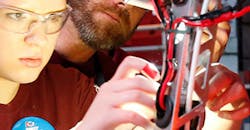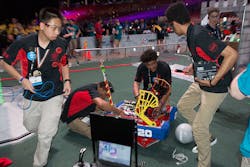FIRST World Problems: Robotics Competition Grooms Brilliant Minds
Another NFL season kicked off last week with packed stadiums and peak television ratings around the country. The NBA and NHL are both scheduled to gear up again next month. The Major League Baseball postseason is weeks away.
And, after months of preseason and early prep, the FIRST Tech Challenge is back for another year of engineering, robotics and competition.
For most Americans, one of those things is not like the other. We pay big bucks to watch pro athletes, after all, and just about every major TV network pays even bigger bucks to broadcast the games. Not many folks are fired up about watching high school kids fiddle with robots on what can best be described as an indoor obstacle course.
Where are our priorities?
“Kids will get good in anything that adults make them think is important,” said Dean Kamen, the legendary inventor and entrepreneurs who is most famous for dreaming up the Segway. “That’s why we have no shortage of entertainers and ball-bouncers. But they will not improve our quality of life, and the world needs to start making heroes out of the right people.”
Enter FIRST, the not-for-profit that Kamen established with MIT professor emeritus Woodie Flowers almost 30 years ago. More than 1 million kids have participated during that stretch, and those who are a part of it right now are gearing up for the next FIRST Tech Challenge.
The 2017-18 Tech Challenge — called RELIC RECOVERY — involves robots (of course) and some seemingly wacky scoring (which isn’t so wacky when you really think about the scoring objectives of most other sports or competitions) — months and months of prep for two and a half of minutes of execution. That’s engineering, though. It’s sports, too. (The YouTube video linked above that introduces this season’s challenge already has some great comments from students, including one from Monica C., who wrote, “And I thought middle school was hard.” Remember those days?)
“I think the sports model works beautifully. Why don’t we use it?” Kamen said. “When I started FIRST, all I said was, Let’s find superstars from the world of tech. We can make a real difference with what happens in this world.”
The FIRST Tech Challenge season runs from September through May, with teams competing at qualifying and super-qualifying tournaments, and then state, regional, super-regional and national championships. Nearly 3,000 teams are already registered, according to an exhaustive search function on the FIRST website, and more than 60,000 students are expected to participate in the competition building and programming robots. (More than 4,000 other teams are a part of the FIRST Robotics Championship, which culminated in the Global Robotics competition and took over Washington, D.C., for a week in July.)
“FIRST is about so much more than robots,” said Matt Grob, executive vice president of technology for Qualcomm Technologies, Inc., which is the presenting sponsor of the year-long event. “In addition to hands-on experience with cutting edge technology, FIRST participants learn leadership and other skills critical to succeed in industries like ours, where brilliant minds need to constantly push the boundaries of what’s possible.”
The idea for the Tech Challenge and other FIRST competitions, of course, is to inspire kids, but also to prepare them with the tools needed for the working world. “Ten or 15 or 20 years from today, some kid in our stands will have cured Alzheimer’s or AIDS or cancer or built an engine that doesn’t pollute,” Kamen said. “Look at these kids. They’re the future, and there’s a job out there for every one of these kids.
“We can complain about the lack of kids studying science and engineering — we can complain about a lot of things — but that’s not what engineers do. We don’t complain. When we have problems, we solve them.”
Are you or your children involved in the 2017-18 FIRST Tech Challenge? IndustryWeek and New Equipment Digest want to hear from you and them so we can share some great stories about our younger engineers — those tweens and teens diving into industry — over the next year. Send an email to [email protected] or [email protected] and let us know the challenges they’re working on with their teammates.
This article originally appeared in Industry Week.

